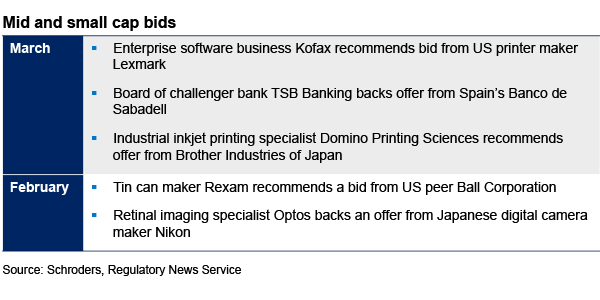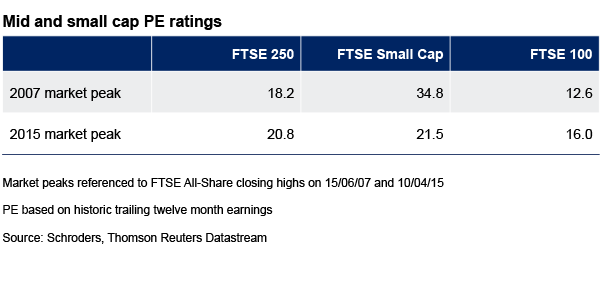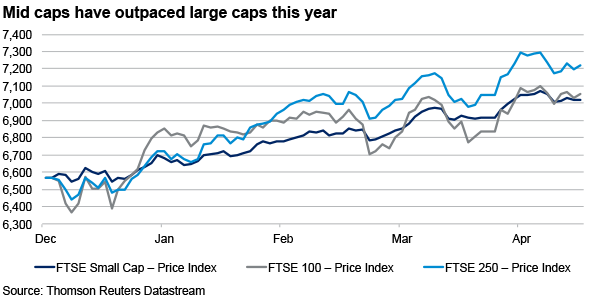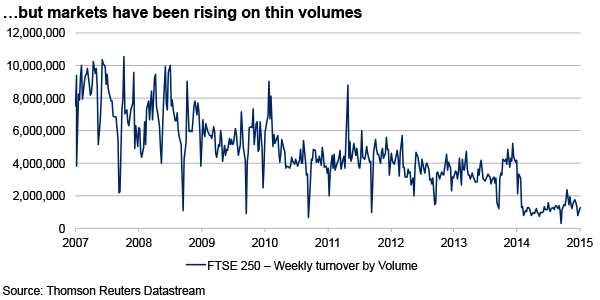
Schroders: UK mid caps - the hunt for pricing power
Rosemary Banyard sets out her views on the market and prospects for the FTSE 250: We are cautious about UK equity valuations, which now look quite expensive, and as a result it is currently hard to find mid-cap companies that offer absolute value.
06.05.2015 | 10:51 Uhr
We remain very selective about how we deploy our funds, as always vigilant with regards to the quality of company accounts.
Although we are not enthusiastic about the prices of stocks, they are undoubtedly cheap relative to government bonds, where yields are at extremely low levels. Such unattractive valuations of bonds might explain why equities have so far performed strongly since the beginning of 2015, but we also believe the bulls could be too sanguine about the economic outlook.
M&A activity has driven up valuations
Companies are finding it hard to organically grow earnings in this low-growth world, and so we have seen a slew of merger and acquisition (M&A) activity since the start of the year. The abundance of cheap credit has been a spur to this, as unconventional monetary policy from central banks drives down borrowing costs.

UK-quoted mid and small caps have recommended a series of bids from international trade buyers from the US, Japan and Europe. Such M&A has acted to further drive up market valuations, which in the case of mid caps are now back to levels experienced at the height of the last bull market.

Strong performance has come amid thin volumes
Mid caps have outpaced large caps since January, after the European Central Bank (ECB) announced it would embark on a full-blown quantitative easing drive. This programme of monetary easing has been accompanied by the yield on 10-year German Bunds falling to all-time lows, while gilt yields have tracked lower too.
Confronted with such low returns from fixed income, it’s unsurprising that some investors don’t know what else to buy besides equities. The absence of active buyers of equities is best underscored by the thin volumes which have accompanied the rise in markets since the start of the year.


Macroeconomic backdrop remains supportive
Despite these concerns, UK-focused companies may draw real support from an improving employment picture. The Office for National Statistics reported last month (17 April) that average weekly earnings, excluding bonuses, had risen 1.8% in the three months to February compared to the same period in 2014. This was accompanied by a fall in the unemployment rate to 5.6% in the period, the lowest level since July 2008.
Real wages in the UK have been given a further boost from the positive effect of moderating inflation, as lower oil prices have fed through to the fuel pump. Supermarket food prices and clothes prices have fallen too, albeit the latter may be the result of temporary weather-related factors. Meanwhile, small and mid-cap companies with overseas earnings could well benefit from the relative weakness in sterling against a resurgent dollar. Although those companies exporting to the eurozone could be impacted by the strength of the pound against a very weak euro in response to the ECB’s actions.
As the market has recovered we have seen quite a lot of IPO activity in the small and mid-cap space, and these new companies have on the whole performed well. We have not participated in many, however, and remain somewhat wary about companies brought to the market by private equity sellers, where there has been a burst of activity in recent months.
Fundamental research underpins our investments
While it might be difficult to find absolute value in the current environment, it is not impossible, and towards that goal we continue to employ our bottom-up driven investment process. Fundamental research forms the basis of each investment decision as we look for companies with strong management teams and a proven track-record, good future prospects and a strong business franchise within their markets.
We believe that profits growth is most easily achieved through pricing power. In a world where the industrial expansion of China and India is a deflationary force on manufactured goods and increasingly on services, pricing power is a valuable attribute and our research emphasis is on identifying companies that have this.



Diesen Beitrag teilen: